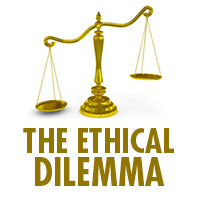The Ethical Dilemma: Is Thanksgiving a Religious or Secular Holiday?

Joan Reisman-Bill answers your questions this week about the ethics of Thanksgiving and merit-based scholarships for college students.
Experiencing an ethical dilemma? Need advice from a humanist perspective?
Send your questions to The Ethical Dilemma at hnn@americanhumanist.org (subject line: Ethical Dilemma).
All inquiries are kept confidential.
Giving Thanks to What? Is Thanksgiving a secular or religious holiday? Isn’t the thanks given to god?
—Talking Turkey
Dear Talking,
There are so few secular holidays, let’s be thankful for this one. While most people might say they are thanking god and that was the original intention, the holiday, like many others in many cultures, sprang from thanks for the harvest—regardless of what you credit for that (e.g., farmers, meteorologists, the inventor of the self-basting Butterball). Since in the U.S. people of all religions and none celebrate Thanksgiving on a federally-established day, and in Canada they do the same but on a different day, it seems to be more of a national observance than any kind of religious one. After all, when else do different religions ever agree on celebrating the same thing at the same time?
Humanists can use the occasion to recognize things we are thankful for, without designating any recipient of the thanks—or by directing our gratitude toward our friends and family, nature, science, life, the universe.
Most modern religious holidays have their origins in religious holidays adapted from earlier faiths, which in turn have their origins in pagan holidays celebrating such annual milestones such as seasons, solstices, etc. So if we humanists want to take existing celebrations that have picked up religious overtones and make them our own god-free occasions, we are just perpetuating (or restoring) what humans have been doing throughout the ages. So enjoy the holiday in your own un-holy way.
Are Merit Scholarships Ethical? My son is applying to colleges. He is an excellent student and we are comfortable enough financially that he will be able to go wherever he’s accepted, regardless of financial aid. I’ve been hearing that colleges are increasingly shifting their scholarship funding away from need and toward merit. While this could be a bonus for us, I’m feeling that it would be unethical to apply for money we don’t need and perhaps depriving someone else who can’t do without it. But we didn’t create these programs, so should we just take advantage of them if we can?
—Unmerited Rewards
Dear Unmerited,
For various reasons, many colleges are indeed swinging away from need- toward merit-based financial aid. Let’s think about why they might be doing that: First of all, just because they are focusing on merit doesn’t mean that needy students will be shut out—as long as they can compete on merit (unfortunately, that’s a big “if” for disadvantaged kids). Perhaps the idea is to increase the odds that students will be successful in the school, rather than setting up high-need, lower-performance kids for failure. Or maybe it’s a way to woo top students away from other schools by making them an offer they won’t refuse.
Bear in mind, while you may be fortunate enough to be able to foot the entire bill without breaking a sweat, you’re in a small minority: Very few families are not challenged by the cost of a college education. So while merit-based awards are not a competition for who needs it the most (or a disincentive to save money for college, which is an argument against need-based awards), they could be deal-makers or breakers for the many families where the money does indeed matter.
So now it comes down to your individual case: Since you don’t require the funding, should you even apply for it? Let’s consider, hypothetically, if your son gets into several of his choices, but his first choice offers him no money and his second choice makes him a generous offer—or his top two choices are tied. Would he stick with his first choice or be swayed to his second, or would the money serve as a tie-breaker? If he would be swayed, that means that the money is an effective sweetener regardless of financial status—perhaps for bragging rights, or feeling wanted, or just for the fact that saving money is always nice. But if the money would have no effect on the outcome, you could certainly skip applying for it and hope it goes to a student who might otherwise be unable to afford that school. Or you could shoot for the scholarship and, if you end up getting it, put that amount aside for graduate school or give it to your favorite cause—such as supporting a need-based scholarship.
